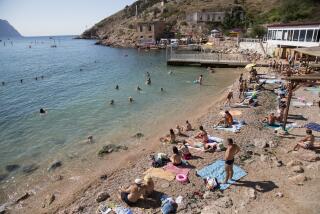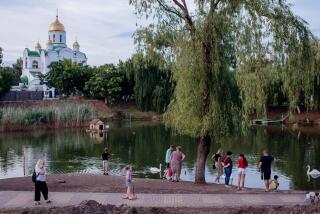Tarnished Czarist Capital Seeks Identity
- Share via
ST. PETERSBURG, Russia — American frozen chickens, dubbed “Gorbushkas,” have become a symbol of hope in this graceful capital of czars, now broke and hungry, but uncomplaining.
The American chickens, named for former Soviet President Mikhail S. Gorbachev and President George Bush, began showing up in shops here after the two leaders agreed last year to liberalize trade between the one-time superpower rivals.
Now Gorbushkas are among the hottest-selling items on commodities exchanges and in food stores in this city of 5 million.
But fresh chicken and other meat are luxuries few Petersburg residents can afford because of triple-digit inflation. Most residents of Russia’s second-largest city still must hustle to find food of any kind.
Humanitarian aid, including Western-run soup kitchens, saw St. Petersburg through the dark days of winter. Food rationing began last year after the breakaway Baltic republics and Ukraine cut off supplies.
Other Russian cities have been able to barter factory goods for farm produce. But 72% of St. Petersburg’s factories produce military hardware, and orders for the fragmented Red Army have been sharply trimmed by the government of President Boris N. Yeltsin.
Now St. Petersburg has nothing to trade.
“You can’t buy a chicken with a tank,” said Rudolph Yefimov, an official of the new St. Petersburg Stock and Commodities Exchange. “You need real money to buy these fat American chickens.”
On St. Petersburg’s once-elegant Nevsky Prospekt, idle factory workers and their families bear troubling witness to the end of the Cold War. Residents eye but cannot buy German beer and American M&Ms; in shop windows.
Stoic Petersburg residents endured the winter’s hardships and hunger with little grumbling, scholars and longtime residents noted. Fifty years ago, they suffered through a 900-day Nazi siege that left more than a million dead in mass graves marked simply “1942” at Piskaryovskoye Cemetery.
Carrying flowers and memories, Petersburgers still trudge over ice-covered sidewalks to the cemetery. They go to honor those who died in savage battles to stop the Nazi advance into Russia, giving Leningrad, as it was then known, a place in history.
But the heroism of World War II has been eclipsed by the unraveling of the Soviet Union, the rebirth of capitalism and the arrival of humanitarian aid from as far away as impoverished Vietnam.
“The only thing we can live on today is hope,” said Yekaterina Boitseva, a food broker at the stock and commodities exchange. “We have too many real problems to dwell on the past.”
Boitseva and her young, well-mannered competitors leave little doubt that St. Petersburg remains the home of Russia’s elite, a bastion of highbrow culture much influenced by Western ideas and fashions.
Recalling St. Petersburg’s pre-1917 days as the financial capital of Russia, Igor Kliutchnikov, 42, executive director of the exchange, said a new breed of Russian capitalists is “creating opportunities as the old Communist system is disintegrating.”
“We live with a glorious past, but we are in danger of becoming a provincial town because of our economic situation,” said Boris Lipsky, vice rector of the St. Petersburg Academy of Art and Design. “It’s hard to say which way we will go.”
Two five-star Western-style hotels have opened, but with rooms starting at $225 a night, they have attracted only a handful of guests, mostly European and American business travelers.
At the ticket office of Aeroflot, the airline of the former Soviet Union, would-be passengers gripe about having to pay world-class prices for international tickets while living on Russian wages, which amount to less than $10 a month at the current exchange rate. A round-trip ticket to New York or Washington costs the equivalent of $1,300, about the same as the fares on Western airlines.
“We used to have an Iron Curtain around us,” said Alexander Urkov, deputy editor of the newspaper St. Petersburg Vedomosti (News). “Now we have a hard-currency curtain, because no one can afford to travel to the West.”
More to Read
Sign up for Essential California
The most important California stories and recommendations in your inbox every morning.
You may occasionally receive promotional content from the Los Angeles Times.













